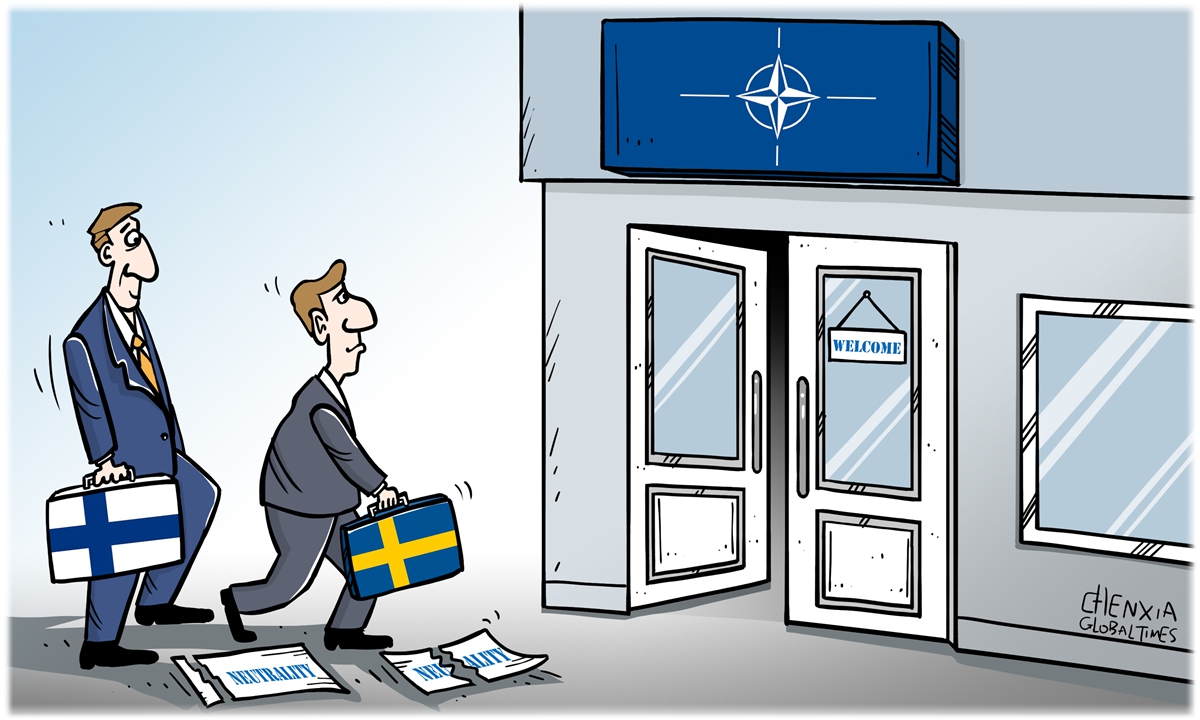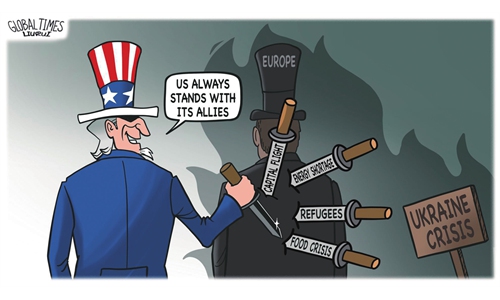Will joining NATO rid Finland, Sweden of fear?

Finland, Sweden, Neutrality. Illustration: Chen Xia/Global Times
Finland and Sweden have announced that they will apply for NATO membership. This move will remove the brands of "neutrality" from the two Nordic countries. It may seem like a major change in European geopolitics, but there is a certain inevitability in the essence - the two countries originally belonged to the old European bloc.The two countries had chosen neutrality out of fear. And right now, out of the same fear, they have decided to defect to NATO. The source of their fear is the ever-present "threat" of the "polar bear" in their immediate neighborhood.
The Russia-Ukraine conflict has fueled their existing fear, but it has also provided them the opportunity they have been waiting for decades - to join their European cousins in containing Russia's resurgence.
Both countries have never seen Russia as a partner to work with, and although they have adopted some policies to promote cooperation with Russia since the disintegration of the Soviet Union, they have done so only as a stopgap measure. They have never regarded Russia as "one of us."
During the WWII, Sweden chose "neutrality" and, under the guise of neutrality, exported large quantities of iron ore to Nazi Germany, which provided a constant supply of steel for the German war machine. Finland itself achieved independence (1917) at a time when the Russian Empire was collapsing due to WWI, and the Nordic country tried to hold hands with Germany in WWII in order to regain its lost ground.
This reminds me of what my landlord said almost 40 years ago when I was studying in Sweden. He was an immigrant from Hungary and at that time Sweden was discussing whether to join the EU. He said that if the two Germanys were unified and became a member of NATO, why couldn't Sweden? In his opinion, Sweden's accession to the EU was inevitable, and sooner or later it would also become a member of NATO.
The geopolitical landscape of Europe did not start to change because of the Russia-Ukraine conflict. It started to change after the unified Germany became the most powerful country in Europe.
Then West German chancellor Helmut Kohl said that the eastward expansion of the European Community should not stop at the Elbe.
After the disintegration the Soviet Union, NATO, instead of shrinking or disbanding, began to expand eastward in parallel with the EU. It changed from a defensive military organization to a bloc that could launch military intervention under the banner of "democracy." Its expansiveness became more and more evident.
While EU member states pledged to support each other in the event of an external attack, this commitment remained largely on paper as NATO existed in lieu of the EU's collective defense. And with the accession of Sweden and Finland, especially with the impact of the Russia-Ukraine conflict on the countries of Central and Eastern Europe, the EU's collective defense will probably accelerate and the ability to carry out external military intervention will be strengthened.
The accession of Sweden and Finland to NATO, while adding to the overtones of NATO's ideological alliance, also exposes the potential ideological inconsistencies among the NATO member states. It is for this very reason that Turkey is opposed to the two countries' membership in the alliance. If this issue would deter Sweden and Finland from joining NATO, it also risks stimulating the EU to accelerate the principle of collective defense.
Sweden and Finland chose to join NATO when Russia was relatively weak and was being "swarmed" by Europe.
Will these two countries ever say goodbye to their fear? Let's not forget the fact - when NATO bases appear on the soil of the two Nordic countries, Russia will have no choice but to directly change the balance in the region with the future deployment of its nuclear and strategic forces. Of course, it will also make them rethink what it would mean to lose their "neutrality" labels.
The author is a senior editor with People's Daily, and currently a senior fellow with the Chongyang Institute for Financial Studies at Renmin University of China. dinggang@globaltimes.com.cn. Follow him on Twitter @dinggangchina


